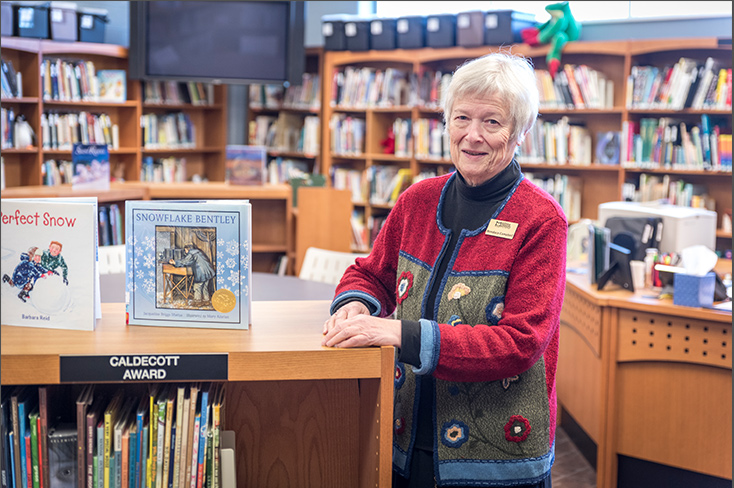Whatever it Takes: Nondace Campbell Plays Unique Role in Mazza Museum
Volunteering at University of Findlay’s Mazza Museum comes in all forms. There are tour leaders, there are docents, there are face painters and there are book readers. Then there are those, like Nondace Campbell, an Assistant Professor Emerita of Reading from UF, who play many roles, and who, in fact, have so much history with the Museum, its staff, and the University of Findlay that there are roles created especially for them.
Campbell, who taught reading at UF from 1972 to 2009, said that when she first got a job offer from then-Findlay College, she wasn’t entirely familiar with the institution. Having grown up in Michigan and getting her degree from University of Toledo, Findlay College was definitely on her radar, but it wasn’t a place where she’d been before. Her sister-in-law, however, knew at least one thing about Findlay College. “I remember when I told my family about getting the offer, my sister in law said ‘Oh, that’s where Dr. Mallett is,’” Campbell said. The late Dr. Jerry Mallett, former education professor and founder of the museum, was, at the time, on a lot of people’s radars. “He was a superstar on the lecture circuit and at conferences and things. I was very excited,” Campbell recalled.
She took the job, and what was supposed to be a one-year grant to help teach reading to students who needed a bridge from high school reading to college reading, turned out to be a career spanning over thirty-five years, and Mallett was a big part of it early on. “Dr. Mallett and [former UF reading teacher] Dr. Marian Bartch were so kind to me when I started,” Campbell said, “we had great fun.”
As a volunteer at Mazza, Campbell has, in a way, come full circle. She was at UF, she said, when the idea of the Museum was just that – an idea, and she had current Mazza Director, Ben Sapp as a student during her teaching days, before going on to teach with him when the University had programs at correctional facilities nearby. The two were on the same schedule and often carpooled together.
During those times of getting to know folks who were already or would eventually become deeply involved with Mazza, Campbell was also learning the benefits of having such a place. Artists would visit in the Mazza’s infancy, and Campbell would soak in as much as she could, seeing the opportunities as beneficial for more than just literacy and art. “It was, and is, better than therapy,” she said. “The exposure to the art and the creativity and the artists’ lives; I used to say that it was an amazing fringe benefit from teaching. The artists are always so kind.”
Now Campbell, who has been out of teaching for some years, disclosed that she is “really good at retirement,” and still loves UF and the Mazza Museum as much as she did that first day of teaching. And it seems that the Mazza and UF staff love her right back; so much so that Sapp created a position specifically for her. Every month, she said, she is in charge of filling out and sending birthday cards to author/illustrator friends of Mazza, and she does roughly thirty to thirty-five of them every month. According to Mazza’s Volunteer Coordinator Heather Sensel, though, Campbell’s “duties” go far beyond that. “We call her and she comes,” Sensel said. “She works in the library; she works in the office; she literally does whatever we ask her.”
“She’s one of the nicest individuals you will ever meet,” Sapp added. “I hold her as high as one can. Those drives to each of the prisons were some wonderful times; very special to me.”
Campbell is proud, she said, of “keeping Dr. Mallett’s dream alive,” and doing whatever things she can to strengthen Mazza’s collection. “Helping to create the opportunity to share all kinds of things,” she explained. “There is great fun in that. I get to see my friends, the authors, and the artwork regularly. It’s a great way to stay involved.”

